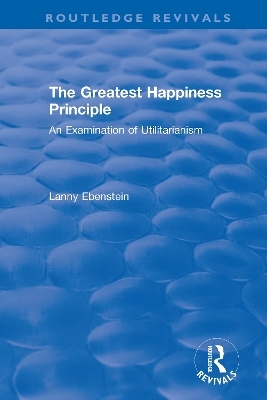
Routledge Revivals: The Greatest Happiness Principle (1986)
An Examination of Utilitarianism
Seiten
2021
Routledge (Verlag)
978-0-8153-6236-4 (ISBN)
Routledge (Verlag)
978-0-8153-6236-4 (ISBN)
First published in 1991, The Greatest Happiness Principle traces the history of the theory of utility, starting with the Bible, and running through Plato, Aristotle, and Epicurus. It goes on to discuss the utilitarian theories of Jeremy Bentham and John Stuart Mill in detail, commenting on the latter’s view of the Christianity of his day and his optimal socialist society. The book argues that the key theory of utility is fundamentally concerned with happiness, stating that discussions of happiness have been largely left out of discussions of utility, it also argues utility as a moral theory, posing the question ultimately, what is happiness?
Lanny Ebenstein
Introduction 1. Happiness in the Bible 2. The Role of Happiness in Plato and Aristotle 3. Epicurus 4. Bentham’s Theory of Utility 5. John Rawls’ Non-Utilitarian Theory 6. A New Theory of Utility Appendices A. Utility and Justice B: Henry Sidgwick’s Utilitarian Contributions C. Comments on Various Utilitarian Writers D. Glimpses of a Utilitarian Future E. Free Will and Determinism F. Teleologism-Deontologism, Consequentialism-Non-Consequentialism G. Why Happiness Bibliography Supplementary Materials: "Mill’s Theory of Utility" Mill’s "Quality" Sidgwick’s Ethics
| Erscheinungsdatum | 31.12.2019 |
|---|---|
| Reihe/Serie | Routledge Revivals |
| Verlagsort | New York |
| Sprache | englisch |
| Maße | 156 x 234 mm |
| Gewicht | 494 g |
| Themenwelt | Geschichte ► Teilgebiete der Geschichte ► Wirtschaftsgeschichte |
| Geisteswissenschaften ► Philosophie ► Ethik | |
| Geisteswissenschaften ► Philosophie ► Philosophie Altertum / Antike | |
| Wirtschaft ► Allgemeines / Lexika | |
| Wirtschaft ► Volkswirtschaftslehre ► Wirtschaftspolitik | |
| ISBN-10 | 0-8153-6236-6 / 0815362366 |
| ISBN-13 | 978-0-8153-6236-4 / 9780815362364 |
| Zustand | Neuware |
| Informationen gemäß Produktsicherheitsverordnung (GPSR) | |
| Haben Sie eine Frage zum Produkt? |
Mehr entdecken
aus dem Bereich
aus dem Bereich
Macht und Herrschaft im Zarenreich
Buch | Hardcover (2024)
C.H.Beck (Verlag)
CHF 69,85
wie die USA und China um die technologische Vorherrschaft auf der …
Buch | Hardcover (2023)
Rowohlt (Verlag)
CHF 41,95


